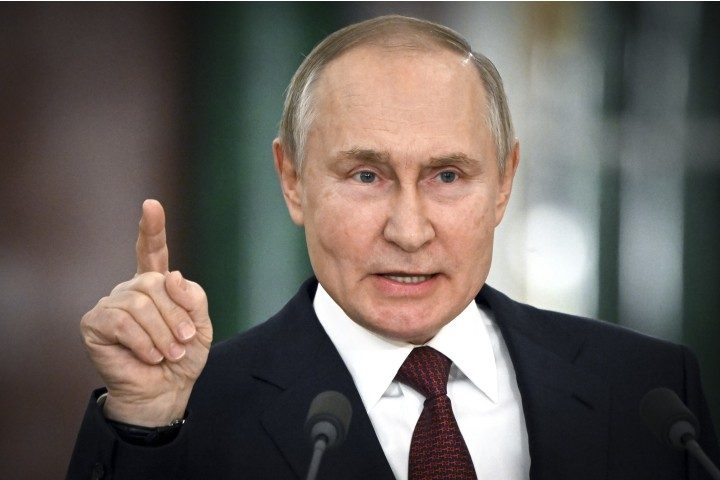
Recently, Russian President Vladimir Putin said in a speech to both houses of the Russian Parliament that Russia would suspend its participation in New START (Strategic Arms Reduction Treaty), the last remaining nuclear-weapons treaty between the United States and Russia. The treaty, which materialized in 2011, is poised to expire in February of 2026.
New START permits each country to ensure that the weapons pact is being adhered to by inspecting the other country’s nuclear arsenal several times per year. The treaty also mandates regular communication regarding military equipment and operations to prevent misunderstandings or accidents.
However, Russia will continue to adhere to limits on the number of nuclear warheads it can deploy under the New START treaty notwithstanding its decision to suspend participation in the significant agreement, the Russian foreign ministry announced.
Based on the treaty, Moscow and Washington committed to deploying a maximum of 1,550 strategic nuclear warheads and no more than 700 long-range missiles and bombers.
“In order to maintain a sufficient degree of predictability and stability in the sphere of nuclear missiles, Russia intends to adhere to a responsible approach and will continue to strictly observe the quantitative restrictions provided for by the New START treaty within the life cycle of the treaty,” the ministry said in a statement.
Moreover, the ministry declared that it would continue to inform the United States of planned test launches of intercontinental ballistic missiles (ICBMs).
In turn, the United States, NATO, and other nuclear powers such as Britain and France slammed Putin’s decision. The United States and its Western allies have offered billions of dollars in military and other aid to Ukraine.
In its statement, the Russian ministry accused the United States of being in non-compliance with the treaty’s provisions and of trying to weaken Russia’s national security.
“There is every reason to state that US policy is aimed at undermining Russia’s national security, which directly contradicts the fundamental principles and understandings enshrined in the preamble of the treaty,” the foreign ministry said.
Moscow said the fundamental geopolitical realities that surrounded the signing of the treaty 13 years ago had changed. It said the provisions had become one-sided in favor of the United States, and that Washington had devised ways to breach its central limits on the number of nuclear warheads that can be deployed.
Checks of nuclear arsenals permitted under New START were suspended in March 2020 due to Covid-19. Also, Russia canceled talks scheduled in Cairo last November on the restart of mutual inspections by Russian and U.S. teams.
In spite of the suspension, Moscow said it was open to resuming participation should U.S. policy toward Moscow change.
“The decision to suspend participation in New Start can be reversed. To do this, Washington must show the political will and make good-faith efforts for general de-escalation,” the foreign ministry said.
“We are convinced that the potential of the treaty in terms of its contribution to strengthening international security and strategic stability is far from exhausted.”
Putin highlighted in his speech that Russia was only suspending, not terminating, its participation in the treaty. Moreover, he said that the West was directly responsible for Ukrainian attacks on bases for Russian strategic bombers deep inside Russian territory.
The Russian premier said that NATO demands that Russia should allow inspections of its nuclear bases under the New START treaty were absurd.
“The US and Nato openly say that their goal is to inflict a strategic defeat on Russia. And what — after that, they are going to drive around our defense facilities, including the newest ones, as if nothing had happened?“ Putin said.
“A week ago, I signed a decree on putting new ground-based strategic systems on combat duty. Are they going to stick their nose in there too, or what? And they think that everything is so simple? What are we going to let them in there just like that?“
Putin said NATO members France and Britain also had nuclear weapons aimed at Russia that should be taken into account.
Russia and the United States together hold 90 percent of the world’s nuclear warheads.
That being said, analysts said Russia’s move meant it would become more challenging to ensure continued compliance with the treaty.
“Suspension of the treaty is not equal to leaving the treaty. I assume there will be no Russian build-up above the treaty limits,” Andrey Baklitskiy of the UN Institute for Disarmament Research said on Twitter.
“But there will be much fewer opportunities to verify this (only national technical means), so compliance will be disputed.”
Analysts chimed in with their perspectives about Russia’s recent decision.
“This is not Putin saying, ‘I’m going to break out of the treaty’s limits and now I’m going to deploy thousands more nuclear weapons,'” Lynn Rusten, vice president of the Global Nuclear Policy Program at the Nuclear Threat Initiative in Washington, D.C., said. “I think it’s about a supposedly legal justification for not resuming inspections.”
“We’re not in a nuclear arms race today,” Rusten claimed. “But it’s very concerning that we soon will be, because the bottom line is, this is the last nuclear treaty governing nuclear weapons of the United States and Russia that is in force. And obviously it’s under incredible strain now, and potentially unraveling. It’s set to expire in three years, and there’s no dialogue going on between the U.S. and Russia about what would come after that.”
“The State Department’s 2023 New START annual implementation report found that Russia was not in compliance with the treaty because it would not permit the United States to conduct on-site inspections, and it did not convene a meeting of the Bilateral Consultative Commission, or BCC, within the set timeline,” Sarah Bidgood, director of the Eurasia Nonproliferation Program at the James Martin Center for Nonproliferation Studies in Monterey, California, said.
“If Russia halts data exchanges and notifications as required by the treaty in addition to on-site inspections and meetings of the BCC, it would make it much more difficult to verify Russia’s compliance with the treaty limits,” Bidgood asserted. “It would also eliminate important sources of transparency, predictability, and regular communication between Washington and Moscow, which are arguably more necessary now than ever.”
Meanwhile, Russia blamed the United States for inciting Ukraine to escalate the war by condoning attacks on Crimea, cautioning that Washington was now directly involved in the conflict because “crazy people” had dreams of defeating Russia.
Moscow was responding to remarks by U.S. Under Secretary of State Victoria Nuland, who said the United States believes that Crimea, which Russia annexed from Ukraine in 2014, should be demilitarized at a minimum and that Washington backs Ukrainian attacks on military targets on the peninsula.
“Now the American warmongers have gone even further: They incite the Kyiv regime to further escalate the war,” Maria Zakharova, spokesman for the Russian foreign ministry, told reporters when asked about Nuland’s remarks.



